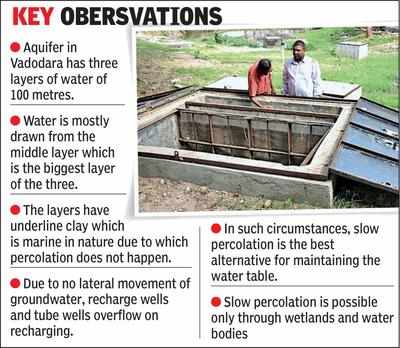
Vadodara: The Vadodara Municipal Corporation (VMC) is contemplating to promote ground water recharge through recharge wells in residential societies of the city. But in the long run the whole exercise may be in vain.
But a hydrogeology study conducted by the city-based Gujarat Ecology Society (GES) suggests that the city needs more wetlands and water bodies to maintain the water level rather than artificial recharge.
The civic body has planned to promote groundwater recharge by constructing recharge wells in residential societies. While the VMCs have proposed to bear most of the expenses, the resident welfare associations will have to bear about a quarter of the total expenditure.
The study conducted by a trainee of GES Nirav Dhadankar under the guidance of Dr Jayendra Lakhmapurkar shows that there is no lateral movement in ground water in Vadodara city as the base is flat.
There are three layers of aquifers and most of the water is drawn through tube wells from the second layer which is the largest aquifer. An aquifer is a body of rock or sediment that holds groundwater.
Lakhmapurkar said, “If we observe the aquifer along the Vishwamitri river originating from the base of the Pavagadh hill, there is a lateral movement till the city of Vadodara and after the city of Vadodara till the river merges with the Dhadhar river.” “Since there is no lateral movement in Vadodara city, the water that is recharged through tube wells overflows,” he said.
The researchers suggest that more wetlands with more groundwater bodies and slow seepage connections should be developed instead of recharge wells.
The city has lost 40 hectares of wetlands since 2005. “Another problem with recharge wells in the city is that they may require regular maintenance as dirt and other particles can accumulate,” Lakhmapurkar said.
The researchers also raised concerns about the industrialization and concrete development around the origin of the Vishwamitri River. “Halol, Jarod and Savali have high potential for groundwater pollution due to industrialization and urbanization which will directly affect Vadodara city in future,” Lakhmapurkar said.
“Villages near Mahisagar river are complaining of contaminated groundwater due to pollution caused by industries in Nandesari. A similar situation may arise in Vadodara as well,” said Dr Deepa Gawli, Director, GES. Contaminated groundwater can have many health hazards as neither RO system nor boiling water can purify it.
FacebookTwitterLinkedinE-mail
.